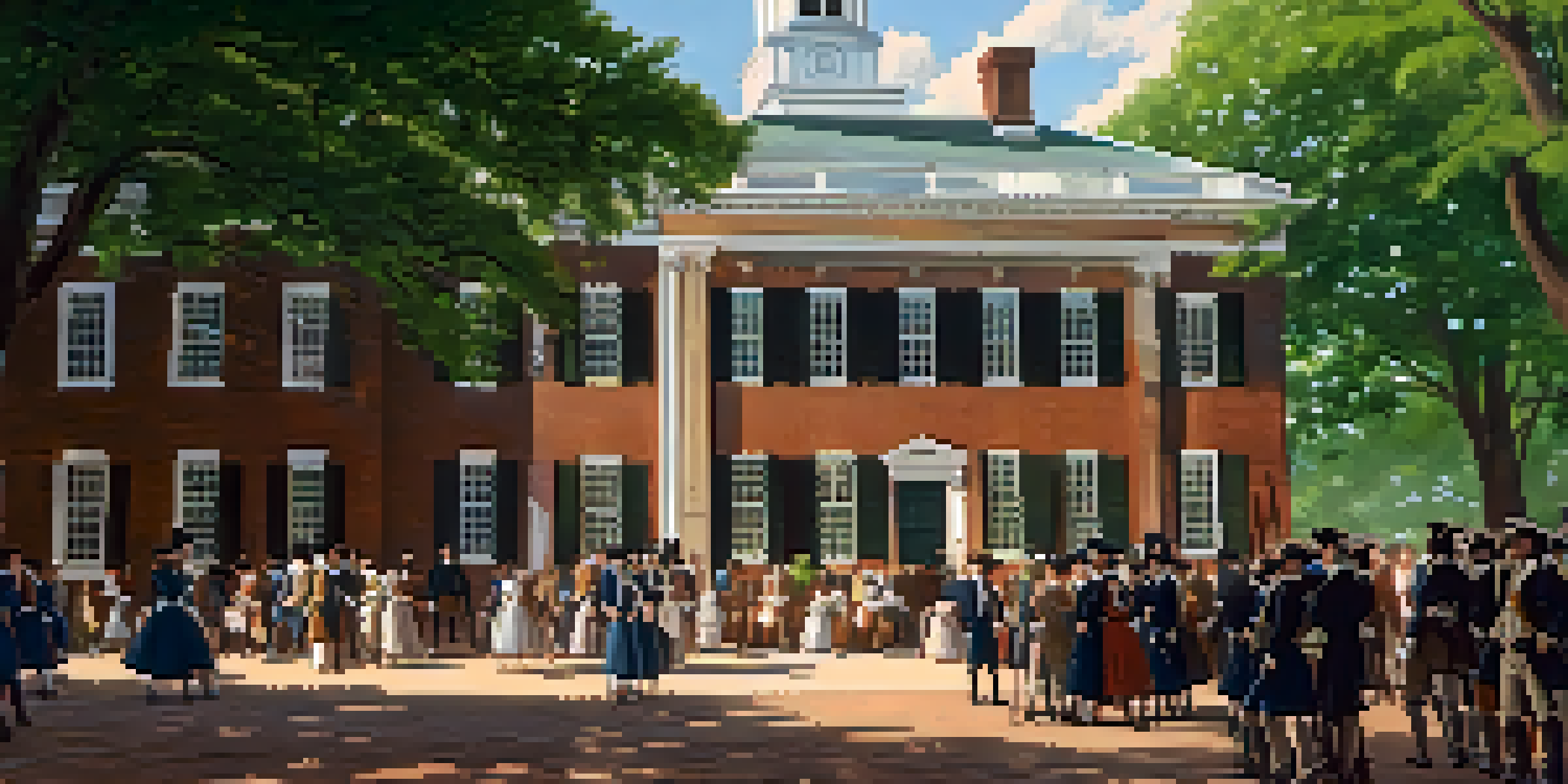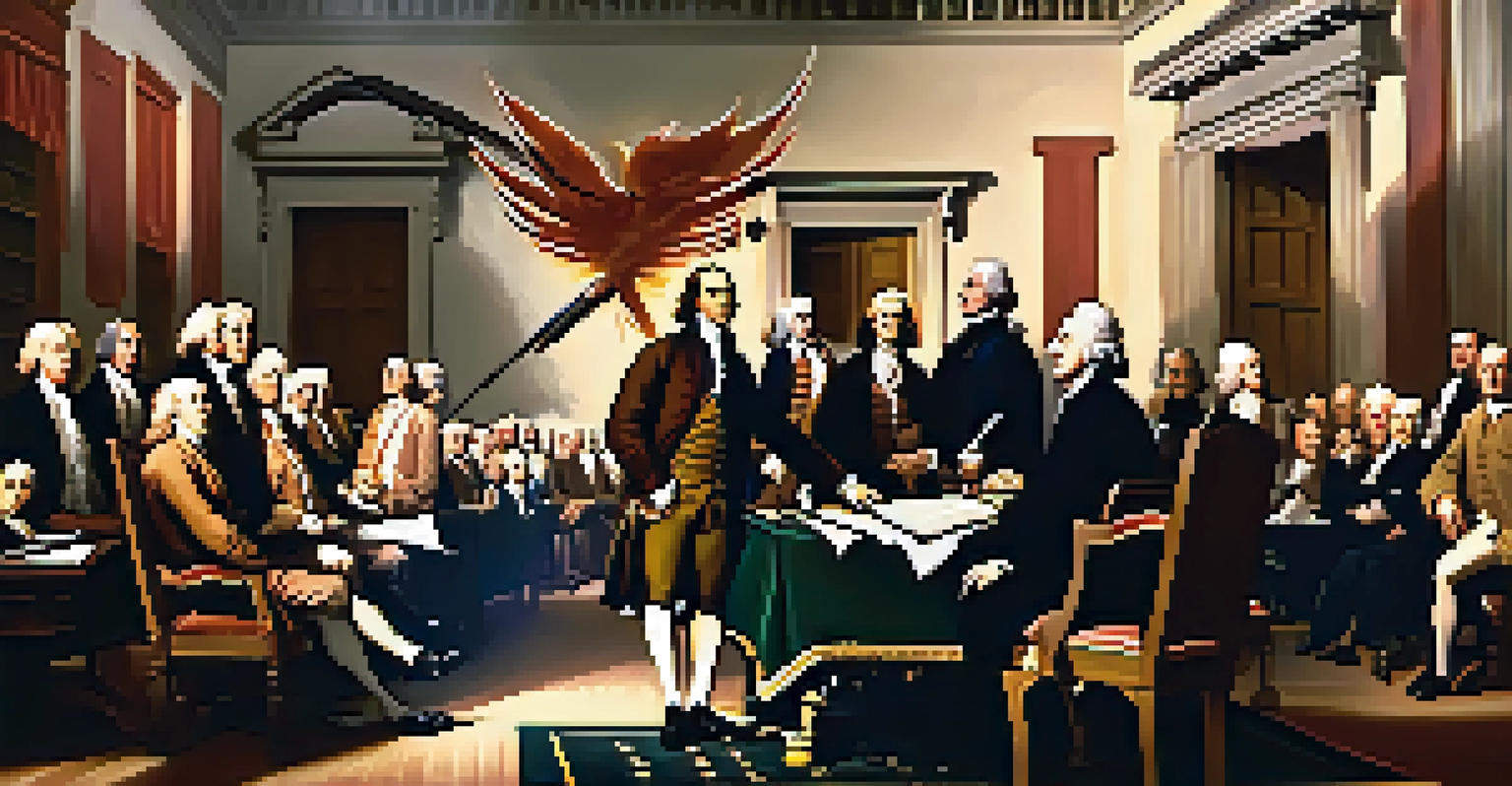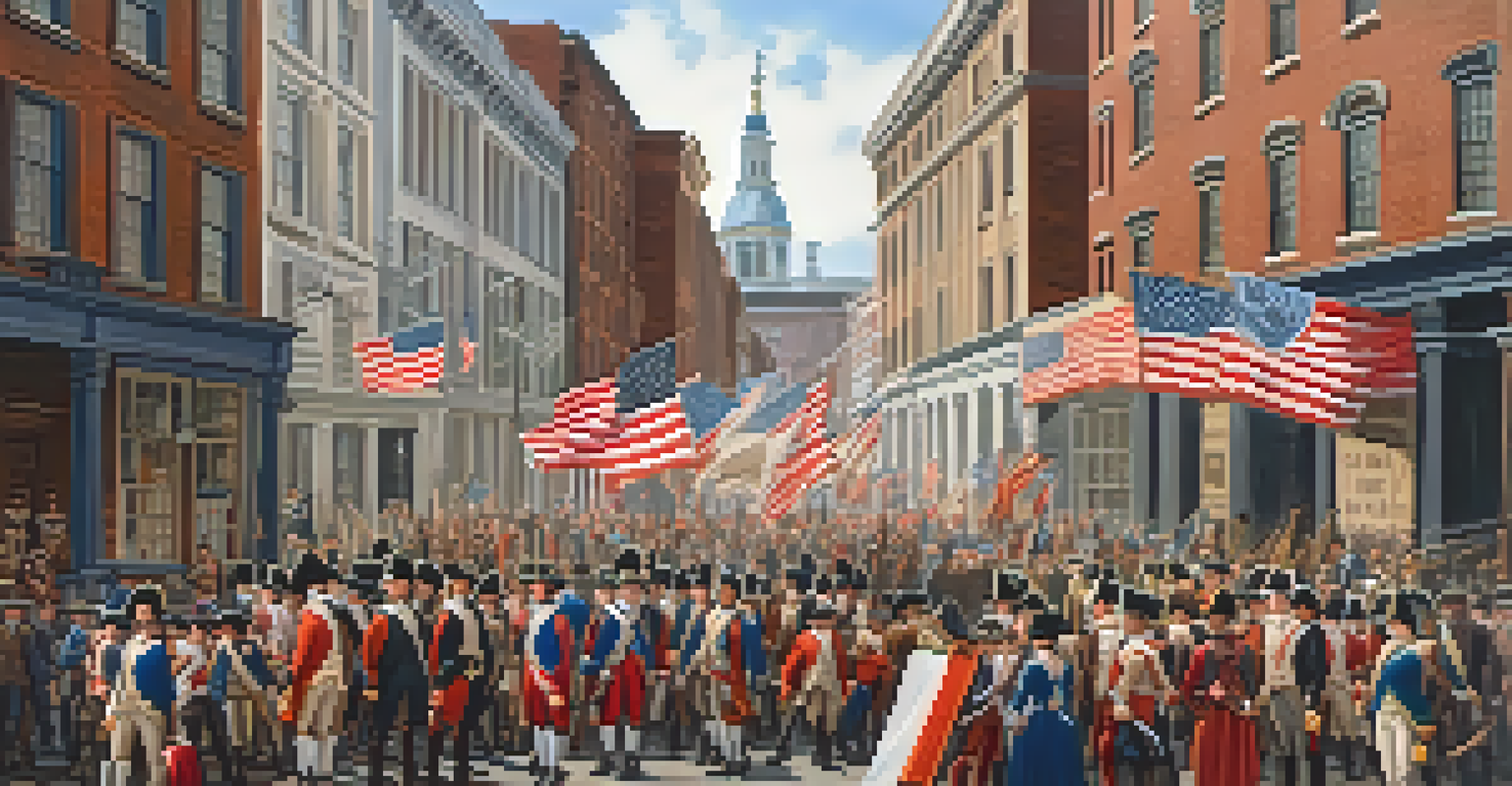The Role of Philadelphia in America's War for Independence

Philadelphia: The Birthplace of Liberty
Philadelphia is often referred to as the birthplace of the United States. It was here that the Continental Congress convened, bringing together leaders who would shape the nation. In 1776, the Declaration of Independence was adopted in the Pennsylvania State House, marking a pivotal moment in American history.
Those who expect to reap the blessings of freedom must, like men, undergo the fatigue of supporting it.
The city's role extended beyond just being a meeting place; it was a melting pot of ideas and philosophies. Influential thinkers like Thomas Jefferson, Benjamin Franklin, and John Adams exchanged views that fueled the revolutionary spirit. Their discussions in Philadelphia laid the groundwork for a new democratic society based on liberty and equality.
As the revolution unfolded, Philadelphia became a hub for activism and dissent. The city witnessed protests, pamphleteering, and public speeches that mobilized support for independence. This vibrant atmosphere of political engagement was crucial in rallying the colonists to the cause.
The Continental Congress: A Historic Gathering
Between 1774 and 1789, Philadelphia hosted the Continental Congress, which played a significant role in uniting the colonies. This assembly of delegates from various colonies was essential for coordinating resistance against British rule. Their collective efforts demonstrated that the colonies could come together for a common purpose.

During the First Continental Congress in 1774, delegates discussed grievances against the British government and strategized about how to address them. The Second Continental Congress, beginning in 1775, took bolder steps, including the formation of the Continental Army. George Washington was appointed its commander, further solidifying Philadelphia's importance in the revolutionary war effort.
Philadelphia: Birthplace of Liberty
Philadelphia was the pivotal site for key events like the Declaration of Independence and the Continental Congress, shaping the foundation of the United States.
These congresses not only facilitated discussions but also served as a platform for drafting key documents. The Articles of Confederation, the first constitution of the United States, were also crafted here, showcasing Philadelphia's pivotal role in shaping the governance of the newly emerging nation.
Philadelphia and the Declaration of Independence
The Declaration of Independence is arguably one of the most significant documents in American history, and its creation took place in Philadelphia. Drafted primarily by Thomas Jefferson, this document articulated the colonies' desire for freedom and outlined the principles of human rights. It was adopted on July 4, 1776, in a ceremony filled with hope and determination.
The price of freedom is eternal vigilance.
The Declaration not only announced the colonies' break from British rule but also rallied support from various factions. Its powerful language resonated with individuals across the colonies, inspiring movements and uprisings. Philadelphia’s role as the site of this declaration cemented its status as a symbol of liberty.
Furthermore, the document's adoption marked a turning point in the war for independence, as it united the colonies under a shared vision. Philadelphia's influence extended beyond its borders, helping to ignite the revolutionary spirit throughout America.
The Role of Philadelphia's Citizens
The citizens of Philadelphia played an integral role in the fight for independence. They participated in protests, boycotts, and local militias, demonstrating their commitment to the revolutionary cause. The city’s diverse population, including merchants, artisans, and laborers, contributed to a rich tapestry of support for independence.
Women in Philadelphia also made significant contributions, often overlooked in historical accounts. They organized boycotts of British goods, supported soldiers, and provided care for the wounded. Their efforts showcased the broader societal commitment to the revolutionary ideals of freedom and justice.
Citizens' Role in Independence
The diverse citizens of Philadelphia, including women and local activists, played a crucial role in supporting the revolutionary cause through protests and community efforts.
Moreover, the city's newspapers and pamphleteers helped spread revolutionary ideas. Publications like the Pennsylvania Evening Post and the American Weekly Mercury informed and rallied public support, proving that the pen could be mightier than the sword in the quest for independence.
Philadelphia as a Military Stronghold
During the Revolutionary War, Philadelphia served as a vital military stronghold. The city was strategically important due to its location and resources, making it a target for British forces. In 1777, the British captured Philadelphia, marking a significant moment in the war, yet the resilience of its citizens and military leaders did not waver.
Even after its capture, Philadelphia remained a center for revolutionary activity. The Continental Congress continued to meet in the city, even as the British occupied it. This determination highlighted the unwavering spirit of the city’s leaders to continue the fight for independence, no matter the circumstances.
In addition to its military significance, Philadelphia also served as a logistical hub. Supplies, troops, and communications flowed through the city, enabling the Continental Army to sustain its efforts against British forces. The city's infrastructure played a crucial role in supporting the war effort until victory was finally achieved.
The Constitutional Convention: A New Beginning
After the war, Philadelphia continued to be a focal point for American governance. In 1787, the Constitutional Convention was held in the city, where delegates gathered to address the issues arising from the Articles of Confederation. This gathering ultimately led to the creation of the United States Constitution, which established a stronger federal government.
The debates and discussions at the convention were intense, reflecting the diverse opinions on how the new nation should be governed. Philadelphia served as a backdrop for these critical conversations, where the future of the United States was shaped. The compromise and collaboration among the delegates in this city were key to the Constitution's success.
Legacy of Governance and Democracy
Philadelphia's historical significance continues today, as it remains a symbol of civic engagement and the ongoing pursuit of democratic values.
The signing of the Constitution in Philadelphia marked another significant milestone in American history. It solidified the city's role as a birthplace of democracy, establishing principles that would govern the nation for centuries to come. Philadelphia's legacy as a site of foundational political activity continued to resonate long after the revolutionary era.
Legacy of Philadelphia in American Independence
Philadelphia's contributions to America's War for Independence are vast and varied. From the Declaration of Independence to the Constitutional Convention, the city has played a critical role in shaping the nation. Its significance is not solely historical; it continues to influence American values and ideals.
The spirit of Philadelphia lives on in its famous landmarks, such as the Liberty Bell and Independence Hall, which attract millions of visitors each year. These symbols serve as reminders of the struggles and triumphs that defined the fight for liberty. They embody the ideals of freedom and democracy that continue to inspire generations.

Moreover, Philadelphia's legacy extends to modern-day discussions about democracy and governance. As a city that once united the colonies, it remains a symbol of civic engagement and activism. The lessons learned from Philadelphia's role in the fight for independence are still relevant, reminding us of the importance of participation in shaping our society.